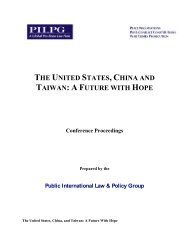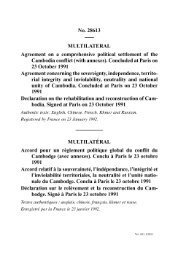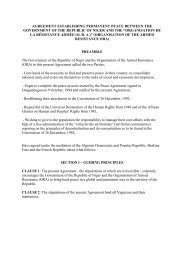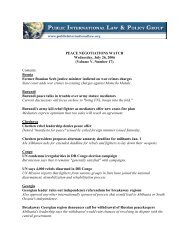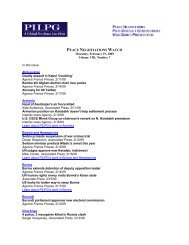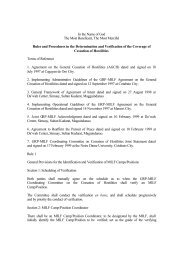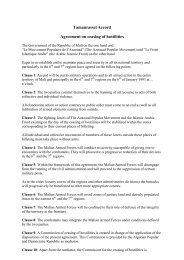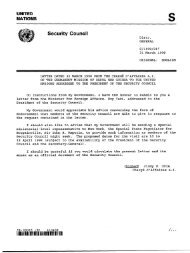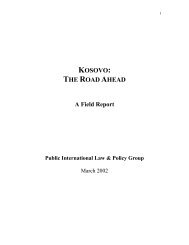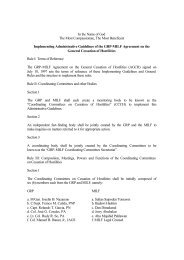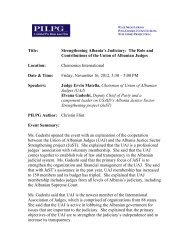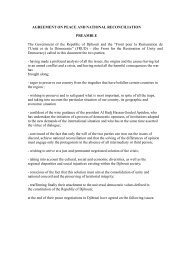Kosovo Albanian Delegation Negotiation Briefing Packet
Kosovo Albanian Delegation Negotiation Briefing Packet
Kosovo Albanian Delegation Negotiation Briefing Packet
You also want an ePaper? Increase the reach of your titles
YUMPU automatically turns print PDFs into web optimized ePapers that Google loves.
3<br />
off for later resolution and to begin the talks with other issues, in an effort to build a<br />
sense of confidence and momentum before tackling the hard issue of independence.<br />
The international community has opted for the second approach—at least for now—by<br />
deciding to begin talks between Belgrade and Pristina on technical issues which, it is<br />
said, will then in some vague fashion evolve into talks on <strong>Kosovo</strong>’s future political status.<br />
The last UNMIK chief, Michael Steiner, apparently adopted the notion of beginning with<br />
talks on technical issues as a way to get the issue off square one in the absence of any<br />
effective policy leadership in either Washington or Brussels. It was also predicated on<br />
the notion that Serbian Prime Minister Zoran Djindjic was a pragmatic politician with<br />
whom it would be possible to work to achieve a realistic outcome in <strong>Kosovo</strong>. Now, with<br />
Djindjic dead and with a divided and weak leadership structure in Belgrade that seems<br />
driven by hard-line political posturing, prospects for this approach appear questionable at<br />
best. The situation in Pristina is not much better. The <strong>Kosovo</strong> <strong>Albanian</strong> leadership is<br />
united on independence as the only acceptable outcome but is internally divided on<br />
almost everything else and seems to have no concept of tactics or strategy for how to get<br />
to its goal. The surge in recent weeks of terrorist violence in <strong>Kosovo</strong>—although its<br />
origins are unclear—could also be a constraining factor on the willingness of the <strong>Kosovo</strong><br />
<strong>Albanian</strong> leadership to compromise.<br />
Many countries outside the region—including some leading members of the international<br />
community—fear <strong>Kosovo</strong> independence because of the potential impact on break-away<br />
regions in their own countries. These sentiments are seldom expressed openly but can<br />
have a powerful effect on the way representatives of these countries approach the issue of<br />
<strong>Kosovo</strong>'s final status. “<strong>Kosovo</strong> can never be independent,” is the refrain with the<br />
unstated subtext being, “and neither can Corsica, the Basque region, Chechnya, nor<br />
Quebec.”<br />
Regional issues are another complication. The neighbors of <strong>Kosovo</strong> have a strong<br />
interest in the outcome of the negotiations but are unlikely—at least initially—to be<br />
invited. The potential impact that changes in the political status or borders of <strong>Kosovo</strong><br />
could have on Macedonia, Bosnia, and Albania is well understood both by regional and<br />
international players. It has always been one of the strongest arguments against major<br />
changes in <strong>Kosovo</strong>'s status. If, on the other hand, the situation on the ground or the<br />
dynamics of the negotiation lead toward changes in <strong>Kosovo</strong>'s status or borders, pressure<br />
could build to broaden the agenda and the participation of the talks beyond <strong>Kosovo</strong> alone.<br />
During the 1990s the notion of “ancient ethnic animosities” often served as an excuse for<br />
diplomatic inaction but in the case of <strong>Kosovo</strong> it is a real factor. Serbs and <strong>Albanian</strong>s<br />
genuinely dislike one another—and events over the past few decades have given both<br />
groups grounds for antagonism. Good personal relations between some Serb and<br />
<strong>Albanian</strong> negotiators are possible—some of the DOS leaders and the non-KLA <strong>Albanian</strong><br />
leaders have known each other for years, going back to the days of the old Yugoslavia,<br />
when both constituted part of the so-called “alternative” to the Communists and then to<br />
Milosevic. But the distrust between the two peoples is deep and not easily bridged. It<br />
will affect the atmosphere and the substance of the talks in a range of tangible and



